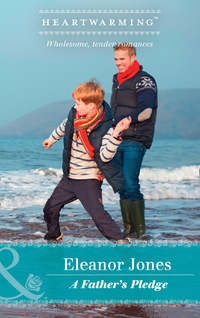
Полная версия
A Heartbeat Away
She took his sleeve, twisting him to face her.
“What is her name? I need it for the records, you see.”
He shook his head helplessly. “I—I don’t know her name. I just…”
The nurse smiled, her blue eyes shining warmly. “I heard what you did for her, and it wasn’t just anything. Dennis told me.”
He eyed her vaguely, and she pointed toward the paramedic with the kind eyes.
“Dennis, over there, the one who was first on the scene. He said that you saved her life.”
Ben shrugged.
“Anyone would have,” he started to say.
The nurse grimaced.
“Don’t you be too sure. Anyway, I must find out her name. Do you know where she lived—or worked, maybe?”
He suddenly remembered, “There’s this.” He removed a tiny purse from his pocket. “I picked it up off the road after…when the paramedics were putting her onto the stretcher.”
The nurse smiled and took it from him, already prying it open.
“Thanks,” she said. “Now, why don’t you go and get a coffee. There’s a machine just down the corridor.”
Ben hesitated and she ushered him off.
“Don’t worry. I’ll keep you informed.”
Strong black coffee hit the bottom of his stomach with a jolt, scalding his throat on the way down. He raced back along the corridor, needlessly spilling coffee in his wake, burning his fingers. Ward B, the nurse had said. His eyes scoured the signs above his head. That was it over there.
The door was closed, but he saw movement behind the glass panel. He peered through a gap. A white-coated doctor blocked his view, and impatiently he moved along. And then all of a sudden, there she was. His heart flipped over. She lay as still as death itself, her face as white as alabaster and her softly closed eyelids a pale translucent blue, but the heart monitor danced and bleeped to prove that she really was alive. He sank onto a chair to wait, sipping the scalding coffee without noticing it burning his lips.
For half an hour he sat motionless, listening to the bleeping machine, hope rising with every minute that passed. When a staccato sound filtered into his head, he glanced up, alarm bells already ringing
A man was approaching, a tall, broad-shouldered man in his early thirties, with a sharply chiseled, handsome face and swarthy suntanned skin. He wore an obviously expensive well-cut navy suit, pale blue shirt, dark blue, unobtrusive silk tie. His shiny black leather shoes clipped along the corridor with purposeful strides.
“I am looking for Lucy McTavish,” he announced in a voice used to commanding attention. “I believe she was admitted this morning after an accident.”
Ben felt his whole world abruptly tilt out of focus. Lucy—the name that haunted his dreams. A familiar surge of guilt stabbed before common sense kicked in, bringing everything back on track again. There must be hundreds of girls named Lucy living in the city. He spoke her name soundlessly, rolling it comfortably around his mouth as he had done so many times before. He liked the fact that this girl was called Lucy, too.
The man stopped beside him, waiting impatiently. His jaw was set, his expression blank and he kept glancing at his cell phone as if expecting it to ring at any moment. Ben stared, mesmerized. If this man really was with the girl in the crimson suit, then how could he remain so impassive? Why wasn’t he running down the corridor, searching for her…screaming out her name?
“Mr. Lyall?” cried the blond nurse, who hurried toward him. “This way, sir. She’s in this ward just here.”
As the man turned to follow her neat, petite figure, Ben saw his dark eyes flicker over her well-proportioned backside. He felt like punching him in his arrogant face. How could he be with the girl from the park? There must be some mistake.
The door into the ward swished shut behind them, and Ben clutched the sides of his chair, fighting off a rush of jealous anger. What was he doing here, anyway, sitting in a hospital corridor in his stupid jogging shorts, watching over a girl who didn’t even know his name—a girl who obviously went for successful businessmen with smart suits and shallow eyes. He stood to leave. It was over. He had done his part, and now it was time to go.
But the glass-paneled wall drew him, making him hesitate. Before he walked out of her life, he needed one more glance at her lovely face just to reassure himself that she really was alive.
The man was half turned from the window, standing quite still, staring at the girl’s motionless figure as a doctor with a worried frown spoke to him in a low, urgent tone. The doctor lifted his stethoscope, making a point, but the man’s expression remained impenetrable and he pivoted to say something to the nurse. She smiled nervously, touching her hair, eyes flickering toward the dials beside the bed.
Ben could see the young woman’s face now…Lucy’s face. He murmured her name, recalling the laughter in her wide-spaced gray eyes, wondering what the hospital staff had done with her silly red shoes. A vivid image of them lying discarded on the cold gray pavement flashed into his mind’s eye, and all of a sudden his stupid jogging shorts didn’t really matter anymore. He would wait just a little while longer, long enough to be sure that she really was going to be okay.
The man walked to the other side of the bed and sat down heavily on a shiny black chair, his face expressionless at the sight of the slight form beneath the cream blanket. The nurse spoke to him, nodding, her eyes bright as she gestured toward the door with her clipboard. Ben stepped back from the window. Ahead of him, the endless, antiseptic corridor stretched toward an exit sign and sweet fresh air. He headed toward it, his heart in his boots.
“I believe I owe you.”
The man’s voice rang out behind him along the quiet of the corridor, deep and faintly mocking. Ben clenched his hands and slowed his steps, but he didn’t look back until the voice came again.
“They tell me you saved Lucy’s life.”
Ben took a breath, composing his face, self-consciously aware of his bare suntanned legs and tousled hair.
“I just happened to be there,” he said, meeting the hooded eyes and recognizing the ferocity that lurked beneath their outward calm.
“Well…thanks.”
The man, Lucy’s man, held out a broad tanned hand with perfectly manicured nails, and for one brief moment Ben gripped it, smiling awkwardly.
“Let’s just pray that she pulls through,” he whispered.
The man’s thin lips twisted into the semblance of a smile. “I don’t do praying,” he said. “Anyway, don’t feel you have to hang around. I’ll manage things from here.”
A prickle lifted the hairs on the back of Ben’s neck as he watched the man walk away, shoulders squared, head raised, shiny black shoes clipping on the gleaming utility floor.
“I’ll wait awhile longer,” Ben said loudly. “Just to see how she goes.”
There was a moment’s hesitation in the tapping of the man’s shoes and he glanced back. Ben ignored him, concentrating on his now-empty polystyrene coffee cup. The door to Lucy’s ward swished shut and he sank onto the hard plastic chair again, listening to the regular bleeping of the monitor…the sound of Lucy’s heart. Perhaps if he waited just a little while longer she would open her eyes.
Half an hour crept by. Nurses hurried past him, giggling, following doctors with white coats and important faces. Orderlies in green pushed gurneys with elderly people, their expressions strained, their eyes frightened, oblivious to Ben in his jogging shorts, squeezing his cup into a hundred pieces.
He stood and dropped the remains of the cup it into the trash bin. Easing his cramped muscles, he moved across to peer through the glass panel once more. The man was sitting quite still, seeming to read a newspaper yet studying the blond nurse, who was adjusting tubes and making notes on a clipboard. Oblivious to his attention, she hung the board over the end of the bed, walked across toward the swing doors and out into the corridor, a preoccupied expression in her pale blue eyes.
Ben tried to get her attention, but she just shot him a half smile before hurrying by. On sudden instinct he stepped forward to take hold of her arm. When she looked around in surprise, he gave her what he hoped was an apologetic smile.
“How is she?”
A shadow passed over her attractive English-rose features. “She has a long way to go,” she told him quietly. “Apart from being badly battered and bruised, she has some cracked ribs and a broken leg. Our real worry, though, is her head injury. If she doesn’t stabilize soon, we may have to operate.”
Ben felt as though someone had hit him hard in the pit of his stomach, and his arm dropped to his side.
“I’m sorry,” she murmured, edging away from him. “Now, I have to go and get the doctor.”
Just behind them, the door swished open again and the man appeared. He dismissed her with a glance, and as she scurried away, he turned to Ben, jaw clenched, eyes half closed.
“There really is no reason for you to hang around here,” he remarked in a cold, flat voice. “They say that she’ll…”
Behind him, the bleep of the monitor faltered. He hesitated, glancing back. When its regular bleeping became a single high-pitched tone, Ben pushed past him and burst through the swinging doors.
Her face was deathly pale against the pillow, blue-lidded eyes closed against her cheeks, thick dark lashes lying upon her translucent skin like two small, perfect fans. And beside the bed, a single green line across the monitor and that awful, final, single tone as her life ebbed.
Ben stood frozen for a moment as the whole ward came alive with the urgent buzz of controlled panic. Firm hands bustled him out into the corridor. He heard the thumping sounds as the doctors struggled to shock her failing heart back to life again, then a desperate voice.
“It’s no good. She’s gone.”
And he started to run, down the endless, faceless corridors, anywhere away from this place that already haunted his dreams.
CHAPTER 3
They say that your life flashes in front of your eyes in the moments before you die. Mine didn’t. And as the hard gray pavement rose up to meet me, I clung to that one stupid thought, knowing that I didn’t want to die like this, here among strangers on the cold, wet street.
I was beyond feeling, beyond anything but an acute and horrified awareness of the violent events that had overtaken my body, hurling it onto the road like a helpless doll. I knew I was broken before I felt the crack—the pressure was just too strong for flesh and blood to bear. And in the instant that I felt my bones give way, there even came a kind of relief that the terrible pressure was released, that my life wasn’t flashing in front of my eyes. So I couldn’t be dead…could I?
Far, far away I could hear the squeal of brakes. Someone was calling, but I knew I had to go. I wasn’t dead, was I? I just needed some time out, needed to let myself slip away from the violent events that had overtaken me…needed to find Daniel. Was he out there somewhere, searching for me?
I felt a hand, soft against my cheek, stroking the hair back from my brow. He was here. Daniel was here. I tried to open my eyes, but my body refused to obey the distant commands from my brain, and as I felt myself beginning to slip away, a deep, trembling voice rang out inside my head, begging me to stay. I wanted to stay so much, but the darkness clawed at me with comforting fingers. Then the voice began to fade and a glorious blaze of light exploded inside my head, bursting out again in myriad colors to hover way above me, beckoning with the promise of peace. And when the dark fingers wrapped themselves more closely around me, I let myself go.
They say that your life flashes in front of your eyes in the moments before you die. Mine just flowed, on and on and on in an endless river of memories, long forgotten and eagerly relived. And they all began and ended with Daniel Brown.
CHAPTER 4
My feet felt cold in my scuffed red shoes and my hand, in the tight clasp of my mother’s, was gradually going numb, yet still I refused to put one foot in front of the other.
“Lucy!”
My mother’s voice was loud and angry, but I just made my legs very straight when she attempted to drag me forward, frowning up at her with the stubbornness that she said I got from my dad.
“I want to go home.”
I started to cry with great big sobs, just like the ladies in the films that my mom was always watching on TV. All it seemed to do was make her even crosser than she already was, and she began to yank so hard on my arm that it felt as though it was going to come right off.
“Well, I have to go to work, and you, young lady, are going to school whether you like it or not.”
For a second she stopped and gazed down at me. I scowled back with all the selfishness of a six-year-old, not noticing the harsh grooves that ran prematurely down either side of her mouth, or the tired lines that made a delicate network around her faded gray eyes. As far as I was concerned, my mother was as old as Methuselah. Thirty-five on her last birthday. How could she ever remember what it was like to go to school? If only my dad had been here. It would have been different. He would have understood my fears. He would have done something about Mollie Flynn. He would have understood about her. He would have known that I couldn’t go to school because she laughed at me and pinched my arms and stole my books so that I got into trouble with Mrs. Meeks. I hated Mollie Flynn and I wasn’t going to school. But my dad was long gone—“Up to no good as usual,” my mother said. I knew, though, that he would return one day, for wasn’t I the apple of his eye? I was. I know I was. He had told me often enough.
My feet hurt in the scuffed red shoes. They were a bit too tight, but I refused to wear anything else because my dad had bought them for me and I loved them with all my heart. The day he’d brought them home, my mother had gone mad, ranting on and on about having no money, but I thought it was just so special for my father to buy me such beautiful shoes when he had hardly any money at all. Well, at least he had had some that morning. But my mother said it had gone on a horse, so I supposed he must have bought a horse as well as my lovely red shoes. He was such fun, my dad, tall and good-looking, with sparkling blue eyes and a really wide laugh. He was always doing exciting things. But all my mom ever did was to get angry with him, and that made him sad, so it made me sad, too.
He went away that night and I haven’t seen him since, but I know he will come home soon because I am the apple of his eye. I hope his horse is okay.
Two bright spots of red popped up on my mum’s pale cheeks. That was how I knew that she was really mad, because her face did that on the day my dad gave me the red shoes and bought that horse. But I wasn’t frightened; at least, I was, but I was more afraid of Mollie Flynn.
We were nearly at the school gate when a blue car drove up. We didn’t have a car, but I didn’t mind about that anymore because we had a horse now, even though I hadn’t seen it yet.
My mom stopped and looked at me. Her face was all shiny and she wiped her forehead with her hanky, but she didn’t let go of my hand. I would have run away if she had.
I knew the big lady who got out of the car. She always wore nice clothes and her face was smiley. She had a boy who went to our school. He was older than me, but I sometimes saw him in the playground; I think he was in the eight-and-nine-year-old class like Mollie Flynn. I wondered if she nipped his arms. Yet I didn’t think so, because he was taller than her. He was even taller than some of the boys in the top class.
“Are you all right, my dear?”
The lady’s voice was soft and kind, and it made my mom cry. I don’t know why, but she rubbed her eyes and they were wet, so she must have been crying.
“I’m sorry,” my mother said, and her voice was a bit quivery, as well. “Everything seems to have gotten on top of me this morning. Lucy’s playing up and I’ve missed the bus for work.”
I stared at my shoes and pulled the worst face I could, but the lady just patted me on my head.
“Come on now, Lucy McTavish,” she said. “Be a good girl for your poor mother.”
I looked up at her and lifted my chin as high as I could. “My dad has gotten a horse,” I told her, and she didn’t laugh.
“It’s true,” I repeated defiantly. “My mom says all his money has gone on a horse, and she’s mad because he hasn’t got any left, but I’m glad, because I really like horses. And…” My voice sank to a wobbly whisper and I glared at my mother. “And now he won’t come home, and it’s her fault.”
There was a funny silence then. I felt my mom’s hand get even tighter on mine. She gazed at the lady, and did so with such sad eyes that I felt bad inside.
“It’ll be all right soon, though,” I told her, wanting everything to be okay again. “Because he’s gone away to try to get some more.”
The silence deepened and the lady reached for my other hand.
“Don’t you worry,” she said to my mother. “I’ll handle this. You get yourself off to work now.”
“Are you sure?”
My mom was all happy and her eyes were wet again. I wanted to shout at her to stay, but I didn’t dare, so I stared down at my red shoes once more and thought about my dad.
“You be a good girl for Mrs. Brown,” she told me, and then she kissed me on the top of my head and walked away.
The lady, Mrs. Brown, lifted me to sit on the wall, and then she lifted her boy to sit beside me. I hadn’t seen him until then because he must have been behind me.
“Daniel,” she said in a very serious voice. “This is Lucy McTavish and she needs some help.”
The boy turned to me and I liked his face. It reminded me of Timmy Brocklebank’s puppy—happy and kind, with warm brown eyes—so I smiled at him and he smiled back.
“I don’t like Mollie Flynn,” I told him. “She pinches my arms and she steals my books so that Mrs. Meeks will tell me off.”
Daniel Brown frowned and his eyes went dark and cross.
“Well, I’ll tell her not to,” he said, running his hand through his curly blond hair so that it stuck right up on the top.
“And I’ll tell Mrs. Meeks about it,” promised his mom.
That was the first time I’d spoken to Daniel, the first of lots of times. He was my hero, always there for me, always quick to help me when I had a problem. After he spoke to Mollie Flynn, she didn’t nip me anymore and, sometimes, she even smiled at me when we met in the canteen.
He lived in a rambling farmhouse, just down the lane from our gray-stone, terraced cottage. I used to go there sometimes on the school holidays when my mom was at work.
His house was very old, with lots of corridors and windows that resembled a face if you stood right before the front door on the smooth green lawn. We weren’t allowed to play on Mr. Brown’s lawn, but around the back was a huge overgrown area with bushes and trees and a swing and a slide. Daniel and I spent hours there, tunneling dens and building tree houses that always fell down. Daniel was good at making things.
The farm was called Homewood, and I thought that it was the best place in the whole world. I used to dream that one day we would all live there together, when my dad came home.
It was on the day that I found my mom sitting on the bottom stair in the hallway, a letter in her hand, that my dreams began to fade. Her thin face was all crumpled and tears ran in tiny rivers down the lines at the sides of her mouth.
She waved the letter at me, then threw it across the dark hall. It fluttered onto the floor and her head dropped forward into her hands.
I watched the tears run through her fingers and drip onto the floor, making small pools on the worn carpet, and I knew that something very bad must have happened. Fear washed over me in great big waves and I clasped my arms around myself, moving from foot to foot, wondering if I should go get Mrs. Brown—she always knew what to do. Then suddenly my mom looked up at me and her eyes were all glassy and red.
“Now see what your precious father has done,” she yelled, pointing at the letter.
I just stood and stared at her, my mouth wide-open and a lump inside my chest. She picked the letter up and screwed the paper into a tiny ball, twisting and twisting and twisting her fingers.
“They’re going to take our house away,” she shrieked. “And it’s all your stupid, useless father’s fault.”
“Is he coming home, then?” I cried. “Will we see him?”
“Lucy.”
My mother stood very tall, and her face was so white that it shone in the murky light of the hallway.
“I think it’s time you faced up to the fact that your father is never going to come back. He has deserted us, and now he’s lost our home.”
I felt a tide of disappointment well up inside me and overflow into a flood of emotion that took over my small body, emotion just too great for a six-year-old to bear. So I threw myself on the floor, rolling and screaming and hurling abuse at my poor sad mother, who had all of a sudden gone so quiet. She looked down at me, arms crossed over her chest.
“Well, you’d better get used to it,” she eventually said in a dull, flat voice. “I’ve had to.” Then her arms dropped to her sides, and she turned her back on me and started to leave. I felt a really bad pain deep inside my heart, and I sat up and stretched my hands out toward her.
“Mom,” I called. “Mom.”
She hesitated, and I scrambled to my feet, pleading with her not to go. She glanced at me with sad eyes.
“Mom,” I whispered.
The gloomy hallway felt as though it was closing in all around me. She held out her arms, and suddenly I was being squeezed so tightly that I couldn’t breathe and we were crying together.
We sat like that for ages, my mom and me, on the bottom step in the murky hallway, until I had my good idea.
“I know,” I said, feeling happy and sad at the same time. “My dad can sell his horse and then we’ll have some money.”
My mom sucked in a great gasping breath, and she began to laugh louder than I’d ever heard her before, even when my dad was here and they used to be happy. She laughed so loudly that it started to frighten me because her eyes were wild. When her laughter turned to sobs again and her arms fell away from me, I went out of the front door and began to walk toward Homewood Farm. Daniel would know what to do.
The farm seemed a long way down the lane. I stopped to watch a big fat bumblebee inside a purple flower, buzzing and buzzing so that the flower shook and wobbled. After the bee flew off, I picked the flower and tried to stick it into my hair, but it kept falling out, and in the end I just left it lying on the ground and carried on walking along the hot, dusty lane.
The farm was a lot farther than I had thought it would be, and after a while I sat on the grass beside a wooden gate because my legs felt very tired. I wasn’t frightened, though—at least, only for my mom. And then I remembered the wild scary look in her tired eyes—the look that had made her appear like someone else—and I clambered to my feet. I had to get Daniel and Mrs. Brown. My aching muscles brought fat tears to my eyes, but I forced my feet into a jog and set off again along the lane, sobbing quietly in rhythm with my shambling strides, until at last I saw the high gray roofs of Homewood Farm, nestling between two softly rolling green hills.
Relief overwhelmed me, and I stopped to stare at the familiar sign above the gate—as I always did when I visited with my mom. From below an arc of ornate writing, the painted black-and-white cow gazed down at me with big kind eyes. Sometimes the sign swung and creaked so much in the wind that I thought it might make the poor cow feel sick, but today it stayed motionless, as still as the air itself. In fact, the only thing that seemed to be moving anywhere at all today was the red tractor in the field they called the far meadow, just in front of the square stone farmhouse. The tractor was going up and down, up and down, and every time it drove across the field, green grass turned to brown. I watched for a while, just until my legs ceased to ache, and then the red tractor pulled up and Mr. Brown climbed out. I knew it was Mr. Brown because he was the only person with hair so red that it shone like flame in the sunshine, a bit like his tractor.








